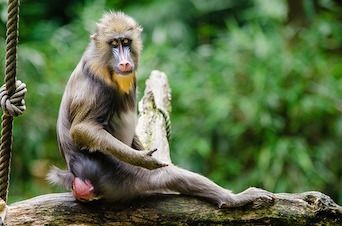Sickness Stinks! Avoiding Infection with Behavioral Immunity
Mandrills use olfaction to detect intestinal protozoa in conspecifics and change their behavior to avoid infection.

Mandrills are Old World monkeys that use olfaction to detect intestinal protozoa status in conspecifics and adopt social behaviors to avoid infection, according to a study recently published in Science Advances. The study results support the idea of “behavioral immunity,” a term created by a psychological scientist to describe psychological mechanisms used to avoid infection. Study authors believed this immunity “plays a crucial role in the coevolutionary dynamics between hosts and their parasites.”
Behavioral Immunity
Many animal species live in social groups, increasing the risk for parasitic infection. Because parasites can inflict substantial costs on their hosts, animals have developed behavioral avoidance strategies as a first line of defense against infection. To date, these strategies have been evaluated primarily in narrow social contexts, such as sexual selection; few studies have focused on the broader social effects of parasitism on host social relationships.
For the current study, the authors determined protozoan richness (total number of protozoan taxa) and observed behavioral immunity in 2 large groups of mandrills. Mandrills use allogrooming as a valuable tool to decrease social competition and enhance overall health and well-being. However, allogrooming can also increase transmission of intestinal protozoa.
Results and Discussion
Protozoan Richness
The authors collected skin smears and fecal samples from a subset of mandrills with known parasite status; skin smears were taken from the perineum and one other body part. Of the 7 protozoan taxa typically found in mandrills, Balantidium coli and Entamoeba coli were most prevalent in this study. The proportion of positive skin smears was higher in parasitized than non-parasitized animals. Also, in parasitized animals, the perineum had the highest proportion of positive skin smears.
Grooming Behavior
For several years, the mandrills’ grooming behavior was observed by individuals blinded to protozoan status. Animals with higher protozoan richness received less grooming overall, and less grooming of the perineum, than animals with low protozoan richness. B. coli was the only protozoan taxa associated with a decreased frequency of grooming received in parasitized animals.
A relationship between protozoan richness and grooming given was not observed, indicating the importance of allogrooming direction in intestinal protozoan transmission.
To further analyze the relationship between protozoan richness and grooming behavior, the authors treated a small group of parasitized animals with metronidazole; grooming behavior was compared from 3 weeks before treatment to 3 weeks after treatment. The frequency of grooming received, but not grooming given, increased significantly after treatment versus before treatment.
Olfactory Test Results
Because parasitism often changes body odor, animals can use olfaction to avoid parasitized conspecifics. The authors hypothesized that olfaction mediated the relationship between the mandrills’ protozoan status and grooming behavior.
To test this hypothesis, the authors first analyzed the chemical composition of approximately 60 paired fecal samples taken from 30 animals. Pairs with the largest differences in protozoan richness were the least chemically similar; pairs sharing a protozoan taxon were the most chemically similar. B. coli, E. coli, and Entamoeba histolytica/dispar significantly influenced the relationship between protozoan status and chemical similarity.
Next, the authors rubbed paired fecal samples of differing protozoan richness onto individual bamboo shoots, with an herbaceous plant rubbed onto a third shoot as a control. Mandrills spent significantly less time near the shoot with the highly parasitized sample than near the less parasitized sample, indicating that mandrills “chemically discriminate fecal odors on the basis of the bearer’s protozoan status,” the authors wrote.
Given the study’s results, the authors concluded that “the constant coevolution between parasites and their hosts has not only driven the evolution of defense mechanisms but has also profoundly shaped the evolution of social systems.”
Dr. JoAnna Pendergrass received her Doctor of Veterinary Medicine degree from the Virginia-Maryland College of Veterinary Medicine. Following veterinary school, she completed a postdoctoral fellowship at Emory University’s Yerkes National Primate Research Center. Dr. Pendergrass is the founder and owner of JPen Communications, a medical communications company.
UN, WHO address public health concern over avian flu transmission to humans
April 18th 2024Veterinary professionals working with certain animals are advised to take precautionary steps to minimize risk of infection, while researchers in Texas study potential H5N1 vaccines, antivirals, and antibody therapies for humans
Read More